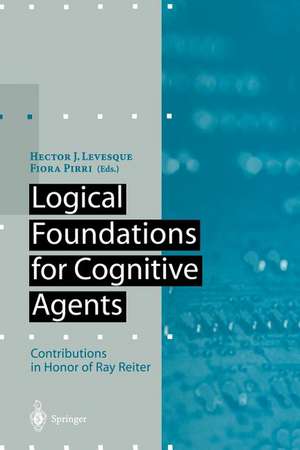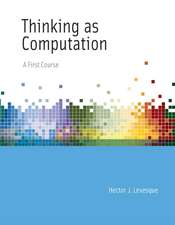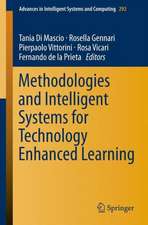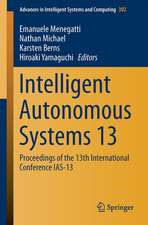Logical Foundations for Cognitive Agents: Contributions in Honor of Ray Reiter: Artificial Intelligence
Editat de Hector J. Levesque, Fiora Pirrien Limba Engleză Paperback – 22 sep 2011
Din seria Artificial Intelligence
-
 Preț: 78.18 lei
Preț: 78.18 lei - 8%
 Preț: 218.19 lei
Preț: 218.19 lei -
 Preț: 78.18 lei
Preț: 78.18 lei -
 Preț: 78.18 lei
Preț: 78.18 lei - 20%
 Preț: 724.25 lei
Preț: 724.25 lei - 20%
 Preț: 721.65 lei
Preț: 721.65 lei - 20%
 Preț: 719.60 lei
Preț: 719.60 lei - 23%
 Preț: 654.44 lei
Preț: 654.44 lei - 20%
 Preț: 365.80 lei
Preț: 365.80 lei - 20%
 Preț: 324.64 lei
Preț: 324.64 lei - 20%
 Preț: 342.28 lei
Preț: 342.28 lei - 20%
 Preț: 659.97 lei
Preț: 659.97 lei - 20%
 Preț: 330.24 lei
Preț: 330.24 lei - 20%
 Preț: 641.01 lei
Preț: 641.01 lei - 20%
 Preț: 555.53 lei
Preț: 555.53 lei - 20%
 Preț: 375.15 lei
Preț: 375.15 lei - 20%
 Preț: 331.58 lei
Preț: 331.58 lei - 20%
 Preț: 661.47 lei
Preț: 661.47 lei - 20%
 Preț: 654.70 lei
Preț: 654.70 lei - 20%
 Preț: 1006.48 lei
Preț: 1006.48 lei - 20%
 Preț: 647.79 lei
Preț: 647.79 lei - 15%
 Preț: 638.89 lei
Preț: 638.89 lei - 20%
 Preț: 1001.16 lei
Preț: 1001.16 lei - 20%
 Preț: 834.69 lei
Preț: 834.69 lei - 20%
 Preț: 326.46 lei
Preț: 326.46 lei - 20%
 Preț: 757.48 lei
Preț: 757.48 lei - 20%
 Preț: 642.19 lei
Preț: 642.19 lei - 20%
 Preț: 328.27 lei
Preț: 328.27 lei - 20%
 Preț: 339.99 lei
Preț: 339.99 lei - 20%
 Preț: 342.96 lei
Preț: 342.96 lei - 20%
 Preț: 648.44 lei
Preț: 648.44 lei - 20%
 Preț: 657.99 lei
Preț: 657.99 lei - 20%
 Preț: 650.27 lei
Preț: 650.27 lei - 20%
 Preț: 330.42 lei
Preț: 330.42 lei - 20%
 Preț: 654.55 lei
Preț: 654.55 lei - 20%
 Preț: 656.03 lei
Preț: 656.03 lei - 20%
 Preț: 652.73 lei
Preț: 652.73 lei - 20%
 Preț: 1000.50 lei
Preț: 1000.50 lei - 20%
 Preț: 709.98 lei
Preț: 709.98 lei - 20%
 Preț: 344.93 lei
Preț: 344.93 lei - 20%
 Preț: 639.35 lei
Preț: 639.35 lei
Preț: 338.81 lei
Preț vechi: 423.52 lei
-20% Nou
Puncte Express: 508
Preț estimativ în valută:
64.84€ • 67.44$ • 53.53£
64.84€ • 67.44$ • 53.53£
Carte tipărită la comandă
Livrare economică 14-28 aprilie
Preluare comenzi: 021 569.72.76
Specificații
ISBN-13: 9783642643064
ISBN-10: 364264306X
Pagini: 424
Ilustrații: XII, 405 p.
Dimensiuni: 155 x 235 x 22 mm
Greutate: 0.59 kg
Ediția:Softcover reprint of the original 1st ed. 1999
Editura: Springer Berlin, Heidelberg
Colecția Springer
Seria Artificial Intelligence
Locul publicării:Berlin, Heidelberg, Germany
ISBN-10: 364264306X
Pagini: 424
Ilustrații: XII, 405 p.
Dimensiuni: 155 x 235 x 22 mm
Greutate: 0.59 kg
Ediția:Softcover reprint of the original 1st ed. 1999
Editura: Springer Berlin, Heidelberg
Colecția Springer
Seria Artificial Intelligence
Locul publicării:Berlin, Heidelberg, Germany
Public țintă
ResearchCuprins
Ray Reiter - A Memoir.- 1 The Early Years I: High school.- 2 The Early Years II: The University of Toronto.- 3 The Middle Years I: The University of Michigan.- 4 The Middle Years II: The University of British Columbia.- 5 A Reiter Aphorism.- 6 A Reiter Aphorism.- 7 The Middle Years III: The University of Toronto (Again).- 8 The Future.- Default Logic and Purity of Reasoning.- 1 An overview of Default Logic.- 2 The logical nature of reasoning.- 3 The modal logics of Default Logic.- 4 Default Logic: a strategy for explicit Definability.- 5 Default Logic: from a single to multiple Contexts.- Computing Domain Specific Information.- 1 Introduction.- 2 The Logistics Domain.- 3 Conversion to Successor State Axioms.- 4 Inner and Outer Boundaries.- 5 Some Examples.- 6 Conclusion.- Specifying Database Transactions and Active Rules in the Situation Calculus.- 1 Introduction.- 2 Active Rules.- 3 Specifying Database Updates.- 4 Specifying Transactions.- 5 Representing Active Rules.- 6 Reasoning from the Specification.- 7 Conclusions and Further Work.- The Frame Problem and Bayesian Network Action Representations.- 1 Introduction.- 2 Actions: Semantics and Basic Representations.- 3 Single Actions: Structure and the Frame Problem.- 4 Multiple Actions: The Frame and Ramification Problems.- 5 Concluding Remarks.- Philosophical and Scientific Presuppositions of Logical Al.- 1 Philosophical Presuppositions.- 2 Scientific Presuppositions.....76.- On Existence of Extensions for Default Theories.- 1 Introduction.- 2 Necessary and sufficient conditions for the existence of extensions.- 3 An interpretation of default rules using object-meta pairs.- 4 Appendix.- An Incremental Interpreter for High-Level Programs with Sensing.- 1 Introduction.- 2 Preliminaries.- 3 Off-line lookahead.- 4 Characterizing on-line executions.- 5 An incremental interpreter.- 6 Discussion.- An Improved Incremental Algorithm for Generating Prime Implicates.- 1 Introduction.- 2 A brute-force algorithm.- 3 Improving efficiency.- 4 Results.- Fixpoint 3-valued Semantics for Autoepistemic Logic.- 1 Introduction.- 2 Autoepistemic logic - preliminaries.- 3 A fixpoint 3-valued semantics for autoepistemic logic.- 4 An effective implementation of V.- 5 Relationship to logic programming.- 6 Conclusions and future work.- Toward Efficient Default Reasoning.- 1 Computation and Nonmonotonicity.- 2 Sufficient Tests for Consistency.- 3 Context-Limited Consistency Checking.- 4 The Mitigating Nature of Defaults.- 5 Experimental Evaluation.- 6 Related Work.- 7 Conclusions and Open Problems.- 8 Acknowledgments.- Action, Time and Default.- Explanatory Diagnosis: Conjecturing Actions to Explain Observations.- 1 Introduction.- 2 Representation Scheme.- 3 Preliminaries.- 4 Explanatory Diagnosis.- 5 Exploiting Regression.- 6 Exploiting the Task.- 7 Related Work.- 8 Summary.- On Sensing and Off-line Interpreting in GOLOG.- 1 Introduction.- 2 The Situation Calculus.- 3 GOLOG.- 4 Conditional action trees.- 5 sGOLOG.- 6 A simple implementation.- 7 Summary and discussion.- Reactivity in a Logic-Based Robot Programming Framework (Extended Version).- 1 Introduction.- 2 ConGolog.- 3 Interfacing the High-Level Control Module.- 4 A Mail Delivery Example.- 5 Experimentation.- 6 Discussion.- A Additional Axioms and Procedure Definitions.- Success of Default Logic.- Search Algorithms in the Situation Calculus.- 1 Dedication.- 2 Introduction.- 3 Search Problems and Algorithms.- 4 The Situation Calculus.- 5 Search Problems in the Situation Calculus.- 6 Search Algorithms in the Situation Calculus.- 7 Depth-First Search.- 8 Breadth-First Search.- 9 Best-First Search.- 10 Conclusions.- Logic and Databases: a 20 Year Retrospective - Updated in Honor of Ray Reiter.- 1 Introduction.- 2 Intellectual Contributions of Deductive Databases.- 3 Implementation Status of Deductive Databases.- 4 Emerging Areas and Trends.- 5 Summary.- Action Inventory for a Knowledge-Based Colloquium Agent. Preliminary Version.- 1 The Electronic Colloquium.- 2 Additional application aspects.- 3 Some examples of tasks.- 4 Agent support for electronic colloquia.- 5 Present organization of the colloquium software.- 6 States and Actions in the Colloquium Domain.- 7 Discussion.- A GOLOG Specification of a Hypertext System.- 1 Introduction.- 2 The Situation Calculus.- 3 Hypertext.- 4 GOLOG: Complex Actions.- 5 Run-time Layer.- 6 Conclusions and Future Work.- Explanation Closure, Action Closure, and the Sandewall Test Suite for Reasoning about Change.- 1 Introduction.- 2 DFL, TC, and the test scenarios.- 3 Coda: The Metaphysics of Change.- 4 Conclusion.- What Sort of Computation Mediates Best Between Perception and Action?.- 1 Introduction.- 2 Embodiment.- 3 Logic.- 4 Action and Change.- 5 Space, Noise and Perception.- 6 Planning, Sensing and Computation.- 7 The Sense-Plan-Act Cycle.- 8 An Implemented Robot Controller.- 9 Conclusion.- 10 Acknowledgments.- 11 Postscript: The Influence of Ray Reiter.- Modeling and Analysis of Hybrid Control Systems.- 1 Introduction.- 2 System Modeling in Constraint Nets.- 3 Requirements Specification in Timed V-Automata.- 4 Hybrid Control System Design.- 5 Behavior Verification Using Model Checking.- 6 Conclusions.
Textul de pe ultima copertă
This collection of papers is the outcome of the work of a community of researchers in AI who, during the last twenty years, have developed the logical formalisms and methods for characterizing intelligent behaviors of agents, knowledge-based systems and processes in terms of reasoning about the environment, actions, and activities that are capable of changing the current state. The book deals with commonsense reasoning, in particular with Reiter's Default Logic formalism, the theory of actions and reasoning about actions, including formalisms for high-level robot control, and different approaches to knowledge representation, all based on symbolic logic.
Caracteristici
State of the art of the most significant research in the logical foundations for both reasoning about action and commonsense reasoning of intelligent agents



















